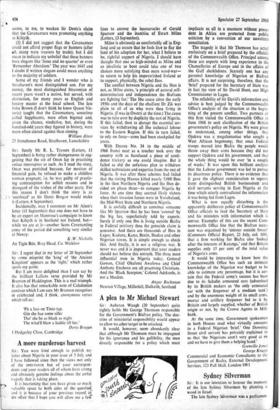A plea to Mr Michael Stewart
Sir: Auberon Waugh (20 September) quite rightly holds Mr George Thomson responsible for the Government's Biafran policy. The doc- trine of ministerial responsibility would appear to allow no other target to be attacked.
It would, however, seem abundantly clear that although Mr Thomson must be impugned for his ignorance and his gullibility, the men directly responsible for a policy which must Spectator 27 September 1968 implicate us all in a massacre without prece- dent In Africa are protected from public criticism by a convention of our unwritten constitution.
The tragedy is that Mr Thomson has acted exclusively on a brief prepared by the officials of the Commonwealth Office. Principal among these are experts with long experience in the Chancelleries of Europe and in the affairs of the Gulf sheikhdoms. Scarcely one has any personal knowledge of Nigerian or Biafran affairs. It is not surprising, therefore, that the 'brief' prepared for the Secretary of State was in fact the view of Sir David Hunt, our High Commissioner in Lagos.
The reliability of Sir David's information and advice is best judged by the Commonwealth Office's analysis of the situation at the begin- ning of the present conflict. Two partners of this firm visited the Commonwealth Office in June 1966 to seek clarification of the British government's policy on Nigeria. We were given to understand, among other things, that Ojukwu was a megalomaniac who sought a West African hegemony; that once Federal troops moved into Biafra the people would throw away their arms beeatise they did not support Ojukwu and his government, and that the whole thing would be over 'in a couple of weeks.' It was upon this brilliant analysis that the Labour government was led to pursue its disastrous policy. There is no evidence that it gave the slightest consideration to reports from distinguished British businessmen and civil servants serving in East Nigeria at the time which utterly contradicted the information it was being fed from Lagos. What is now equally disturbing is the apparently deliberate policy of Commonwealth Office officials to feed the Secretary of State and his ministers with information which is untrue. Examples of this are the recent Com- monwealth Office line that the Biafran seces- sion was organised by 'sinister outside forces' (Commons Official Report, 22 July, col. 108), that a firm working for Biafra also 'looked after the interests of Katanga,' and that Britain supplies only 15 per cent of the total value of Nigeria's arms. It would be interesting to know how the Commonwealth Office has such an intimate knowledge of the Nigerian war budget to be able to estimate any percentage, but it is cer- tain that the Federal army's success has been due to its Saladin armoured cars (advertised by its British makers as 'the only armoured car with the firepower of a medium tank') and by the enormous weight of its small arms, mortar and artillery firepower fed to it by Britain and largely supplied, whether of British origin or not, by the Crown Agents in Mill- bank. At the same time, Government spokesmen in both Houses read what virtually amounts to a Federal Nigerian 'brief.' One Downing Street civil servant has privately explained to us that 'the Nigerians aren't very good at PR and we have to give them a helping hand.'
Grenville Jones George Knapp Commercial and Economic Consultants to the Government of Biafra, External Development Services, 123 Pall Mall, London SW1










































 Previous page
Previous page